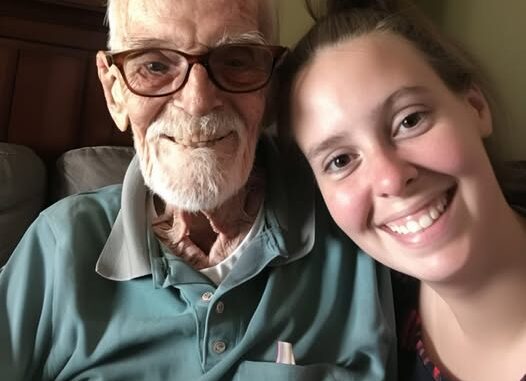
When my father, Frank, needed extra assistance due to his age, I thought hiring a caregiver would make things easier. It was supposed to bring peace of mind, not paranoia. But soon after, we found ourselves dealing with more than we bargained for.
My father was always a proud man—stubborn, independent, the kind of person who would never ask for help, even when he was clearly lost. After a minor fall that left him injured and unable to care for himself, his doctor insisted he needed assistance. Reluctantly, I stepped in and made the call to find a caregiver.
“I can’t be here all the time, Dad,” I said. “You need someone.”
He hated the idea but eventually saw the logic. That’s when Tessa came into our lives. She came highly recommended and was in her late thirties. Her warm presence immediately put both of us at ease. She was patient, sweet, and attentive — everything we needed. Tessa seemed perfect for the role, and Dad took an immediate liking to her. They bonded over old war stories, jazz music, and classic cars. She helped him with meals, medications, and even spent hours with him on the porch listening to his endless stories.
I thought I had finally found the help Dad needed. But then strange things started happening.
At first, I brushed it off. But one evening, as I was clearing the dinner plates, Dad grabbed my wrist. His expression, one I hadn’t seen in years, was filled with fear.
“Sweetheart, she’s not who she says she is,” he whispered.
I was confused. “What do you mean?”
“She takes things,” he said, his voice shaking. “My old flannel shirt, a book from college, and that pocket watch your mother gave me before she passed.”
He sounded terrified. “I don’t trust her.”
I tried to reassure him, dismissing it as forgetfulness. “Dad, maybe you misplaced them.”
But his words stayed with me. Why was he so scared? The next day, I overheard Tessa on the phone, speaking in a low, urgent tone.
“No, it’s not the time yet,” she murmured. “He’s weak. I think I need a week or two.”
I froze. Was she talking about Dad? What was she waiting for?
I decided to keep a closer watch on her. And when I came home the following day, I felt something was wrong. The house was eerily quiet, and Dad wasn’t in his usual spot. Panic set in as I heard crying. Not just any crying — my father’s crying.
I rushed into the living room to find Tessa on her knees, crying, holding a stack of papers. Dad was hunched over, his face buried in his hands.
“Monica,” Tessa said when she saw me. Her voice was raw. “I can explain. Please, just listen.”
I froze, unsure whether to call the cops or demand answers. But then my eyes locked onto the coffee table. There, sitting in plain view, was Dad’s old flannel shirt — and my missing blouse. And in Tessa’s hands, my heart nearly stopped — a DNA test!
“Please, Monica, let me explain,” Tessa whispered. “I didn’t mean to hurt him. I never lied about caring for him. I just… needed proof.”
My mind raced. What was going on?
At that moment, Dad looked up, his eyes red. “She’s my daughter. Your older sister, Monica.”
I stood there, stunned. “What?”
Dad’s voice cracked. “I left her years ago. I didn’t know where she went. But now she’s here. She found me.”
Tessa continued to explain. “I’ve spent my whole life wondering about you, Dad. I had to know who you were. When I found out your name, I had to find you.”
I felt my legs give way as everything clicked into place. The missing items weren’t stolen; they were collected. Dad’s fear wasn’t about her — it was about the past, about the truth he had kept hidden for so long.
“I just wanted to know you,” Tessa said softly, her voice trembling. “But when the test came back positive, I didn’t know how to tell you.”
Tessa had hired a private investigator to track down her biological father. Once she found him, she needed confirmation through the DNA test. But the private investigator had been pressing her for answers, and she wasn’t emotionally ready.
“I wasn’t ready to confront you yet,” she said. “But when you started noticing the missing things, I had to tell you.”
Dad’s hands shook as he reached for her. “I didn’t mean to leave you. I was young, I made mistakes. But if you’ll let me, I want to fix this.”
Tessa hesitated, tears streaming down her face, before she took his hand. “I don’t need you to fix anything,” she whispered. “I just wanted to know you.”
And then, to my complete surprise, Dad pulled her into a hug.
The room was silent for a moment, and I watched, feeling my heart swell. Despite everything — the secrets, the years lost — they were finally connected, not by resentment or bitterness, but by a second chance.
Dad turned to Tessa, his voice soft but sure. “Will you stay for dinner?”
Tessa blinked, surprised. “Dinner?”
He nodded. “I can’t change the past. But I’d like to try, if you’ll let me.”
And just like that, everything shifted. We weren’t strangers anymore. We were family.
For the first time in a long time, I knew we were going to be okay.
